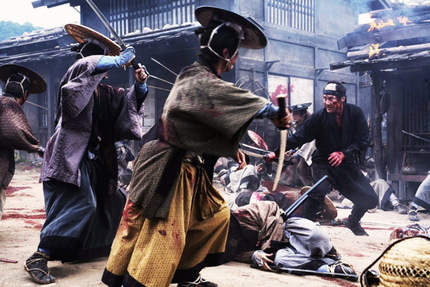ActionFest '11: 13 Assassins Review

[Hey it's available on VOD right now if you wish to follow along, but in light of it being the closing film of this years edition of ActionFest, here is my TIFF review, rescued from the archives to annoy chanbara hard-cores by the facile Kurosawa comparison]
Sure Kurosawa's masterpiece did not have amputees or large beasts of burden running on fire, so there are touches of the director in the margins, but mostly you have some of the most handsome cinematography in a Japanese picture in ages, and a scope and scale that is much further beyond what most would expect from a Miike film. How amazing that a director so prolific can manage to keep his pace for surprises! Normally, when oddball auteurs like David Cronenberg or Peter Jackson do a slick studio picture, a small part of me laments for their wilder more uncouth days. In this case, the results are too damn magnificent to ignore.
It is the mid-19th century, and the Shogunate has known peace for many, many years. The Samurai have grown soft and weak in their inactivity (and boredom), many taking to gambling and drinking. A Grand show of seppuku in the beginning moments plays as a release from failure both literal, and some deeper decay in the soul of the country. That decay is a sadistic lord, Naritsugu, who is on the fast track to real power in the Shogunate. His casual killing and raping for sport, enabled by his noble lineage, has forced the more noble (and more political) advisor to the Shogun, Sir Doi, to set a plan in motion to have Naritsug killed on the way from Edo to his own lands, as to proclaim him unfit to rule would have dangerous political ripples. Doi finds one of the last 'old school' Samurai, Shinzaemon, who has been seriously wronged by Naritsugu, to put a small strike team together for the mission. Since Shinzaemon is played by one of the most gifted actors working in Japan (and abroad) today, Koji Yakusho (many are familiar with his many collaborations with Kiyoshi Kurosawa, but he also occasionally steps into prestige western cinema such as Babel or Memoirs of a Geisha), there is a casual gravitas, an intense confidence, brought to the role, not unlike Lee Marvin in The Dirty Dozen. The gathering of 'the team' comprises the first act of the film and consists of finding a few of the remaining competent swordsman that are trust-worthy, and throwing a few wild-cards in there as well, including a hunter who is clearly channeling Toshiro Mifune (albeit it a tad, just a tad goofier). Shinzaemon gambles his stratagems on the psychotic target, but is soon even in more trouble when Naritsugu's lead samurai is both highly competent and an old friendly rival in school. The second act is like a game of Go between the two Samurai leaders, and is a pleasurable appetizer to the main course of "Total Massacre." Fortifying a town as best they can (and they can indeed), the third act is a doozy of a set piece. A siege, an ambush, a slaughter, a war. It is not surprising that Lord Naritsugu is in both awe of the slaughter, and practically cries tears of joy at the whole-sale carnage (even as, or especially as the thirteen are destroying hundreds of his men) This is the director casting us, the audience, as the psychotic in the narrative that enjoys this sort of thing (Michael Haneke is not around for comment), and indulging us at the same time.
The film acquires some welcome weightiness from all the standard genre conventions when you consider the consequences of a selfish psycho calling the shots and fate of honourable men. The film is not afraid of taking the caste system of the Shogunate to task. Yet, even noble Shinzaemon is 'delighted' to be able to engage in war, his purpose, within his lifetime. The crazy odds of the venture seem to excite him all the more. In spite of all the blood, mud and trampled flesh (or maybe because of it) war is exciting, and Miike never lets the audience forget it. 13 Assassins is a gloriously glossy genre picture that gives an impossible and heroic situation all the glory it is due. It is curious to see Miike do something so straight-forward and crowd pleasing. I am sure he will be off to a new picture (or three) which is as different and wacky and unconventional as is his wont. Sit back and enjoy his stop in epic myth making.
13 Assassins
Director(s)
- Takashi Miike
Writer(s)
- Kaneo Ikegami (based on a screenplay by)
- Daisuke Tengan (screenplay)
Cast
- Kôji Yakusho
- Takayuki Yamada
- Yûsuke Iseya
- Ikki Sawamura

Do you feel this content is inappropriate or infringes upon your rights? Click here to report it, or see our DMCA policy.






